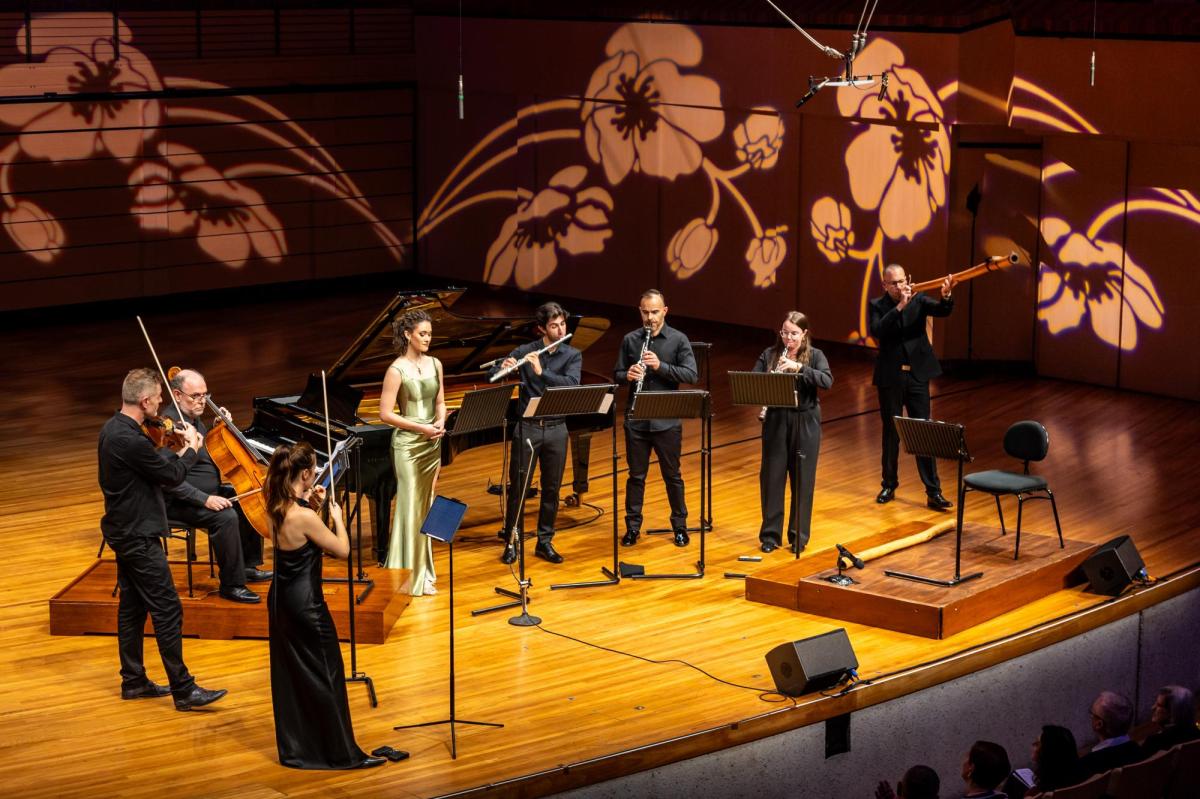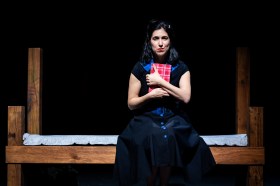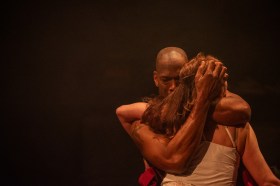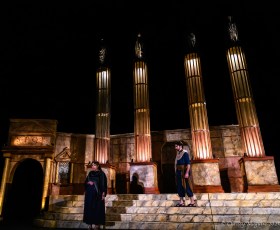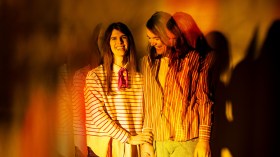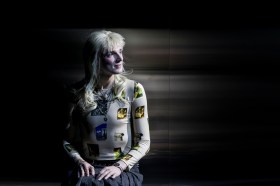A delightful program from Southern Cross Soloists (SXS), Perfumes of the East underwent a major change due to the last-minute indisposition of pianist, Konstantin Shamray. He was to have played Saint-Saёns Piano Concerto No.5, The Egyptian, alongside other work.
In its stead, acting Artistic Director, Ashley Smith, replaced that concerto with two masterly Mozart pieces, the overture from Don Giovanni and his Clarinet Quintet in A major and made other minor position and program changes. Disappointingly, but in the circumstances well understood, these changes sat uneasily with the originally promised concert of eastern delights, which denoted strong Mediterranean and North African flavours.
The concert began with a world premiere work, Juwoon, Tu, Ngyin’anga (Country, Heart, Life), commissioned by SXS as part of its ongoing Didgeridoo Commissioning Project and composed by Stephen Leek. Collaborating with both Wakka Wakka didgeridoo player Chris Williams and Wakka Wakka soprano, Nina Korbe, Leek’s challenge was to bring traditional Indigenous words and sounds together in a contemporary setting with SXS instrumentation. He managed this extremely well, in three separate sections, musically depicting the country, heart and life of Wakka Wakka country inland from the Sunshine Coast.
This piece proved to be a major highlight of the concert – the haunting sound of the didgeridoo matched expertly by the text of traditional songs, played passionately by SXS woodwind and strings. Lyrical and melodic, this evocative and ravishingly beautiful composition showed off Williams’ finely crafted, powerfully executed didgeridoo. Korbe’s ethereal and soaring vocals were rich with meaning, while her warm and powerful soprano rose easily above the excellent accompaniment by strings and woodwind.
Moving some of the original program pieces around on their musical chessboard, SXS then played Ravel’s Vocalise-étude en forme de Habanera, followed by Ravel’s Cinq mélodies populaires grecques and finally Rimsky-Korsakov’s The Nightingale and the Rose, Op.2 No.2. All three pieces were rolled together and played one after the other without any introduction, which was confusing given that the program was out of order. Some explanation would have been welcome.
The Vocalise-étude en forme de Habanera is a marvellous short study, depicting Ravel’s fascination with sound and with particular attention here to Spanish music. Normally played by clarinet with piano accompaniment, the work has all the elements of the Spanish habanera. Technically demanding with its many trills and a range of scales, here it was played by first violin, Amalia Hall, a fine musician. Unfortunately, the flavour of this work failed to ignite as there seemed to be very little resemblance to Spanish-styled playing.
It was followed by Ravel’s Cinq mélodies populaires grecques, five colourful songs with a distinct nod to Greek folk music. Korbe sang these with a joyful exuberance that was as sensual as it was melodic, with excellent phrasing. Often these songs are sung with just a piano accompaniment, which squarely puts prominence on the voice. Here, with both piano, string and woodwind accompaniment, some of the vocal quality was lost, which was a shame, as Korbe’s glowing soprano is worth hearing without much embellishment.
Rimsky-Korsakov’s The Nightingale and the Rose, Op.2 No.2 with its shimmering harmonies and lyrical melodies is a gem. It was played with heartfelt emotion by second violin, Courtney Cleary, and sung with ravishing top notes and depth of expression by Korbe. A slower pace to absorb more fully the anguish of the nightingale may have been welcome.
Vivaldi’s Concerto for Viola d’amore in D major was really well played by the string quartet, the violins and cello supporting the excellent work of soloist James Wannan. The viola d’amore, a special overly-large 19th century instrument of deep resonance, was played by Wannan with immense skill.
The first Allegro movement was bright and bold with its clear musical theme and ritornello. The second Largo movement started playfully with violins playing off the viola, the latter’s rich and melodic playing then rising over the pizzicato violins to great effect. The very fast final Allegro movement built to a powerful climax from the soloist with a final long, slow ending.
Being a last-minute substitute, Mozart’s Don Giovanni overture was the least successful of the pieces presented, due mainly to a lack of instrumentation. There was nothing wrong with the musicianship of the players, but an overture as famous as this, with its brooding, dramatic opening depicting the Commendatore’s statue, requires brass, timpani and additional strings and woodwind. Depth and texture were missing, making the overall sound thin and unmemorable.
As a contrast, Mozart’s Clarinet Quintet in A major, which ended the concert, was a delightful, well presented and polished choice showing the SXS off at its best. This glorious work by Mozart offered clarinettist, Ashley Smith, an opportunity to shine with his exciting and superb playing.
The opening Allegro movement had marvellous virtuosic runs by the soloist, passed over to the strings, and was bright and vivacious. The Larghetto, with its gentle muted strings, offered some lovely phrasing from Hall’s violin with excellent intonation and a measured delivery from the soloist. The Menuetto demonstrated the fine virtuosity of the clarinet with its trills and arpeggios, alongside two separate trios involving soloist and strings, the cello of Andre Duthoit coming into its own here. The final Allegretto offered many variations from its jaunty theme and instruments playing off each other with great aplomb.
Read: Music review: Devonté Hynes, Sydney Opera House
The bookended pieces by Leek and Mozart were definitely the highlights of this concert, which was overall a little mixed due to last-minute changes and additions, which could not have been predicted.
Southern Cross Soloists and QPAC present
Perfumes of the East
Concert Hall, QPAC
Featuring Nina Korbe and Amalia Hall
Southern Cross Soloists: Perfumes of the East was performed on 2 June 2024.
